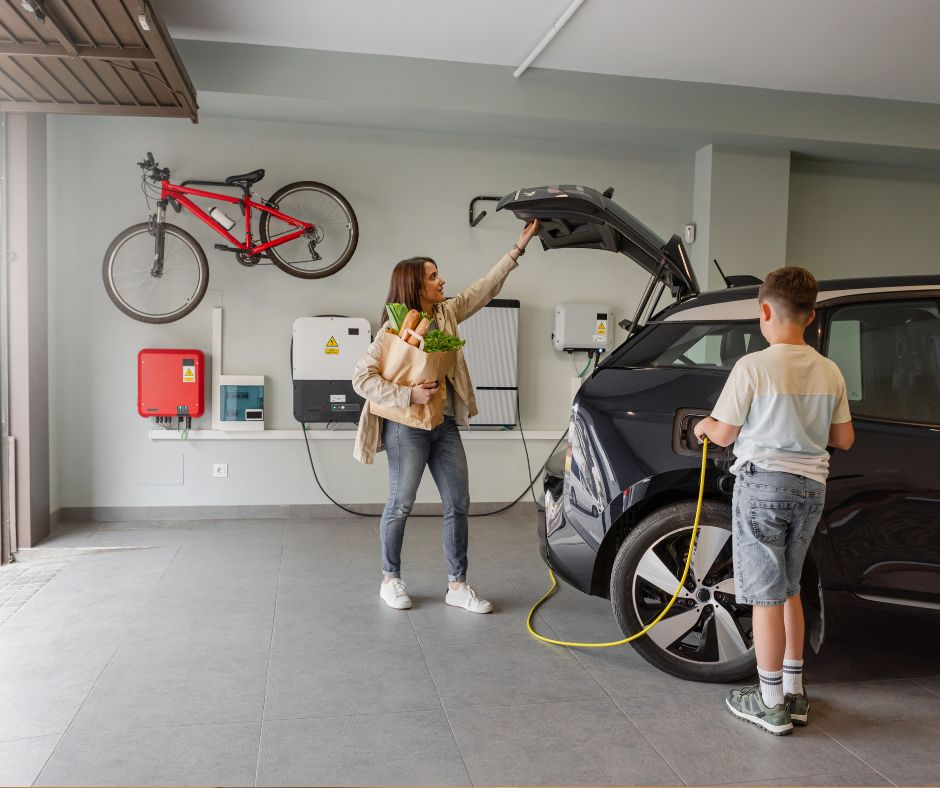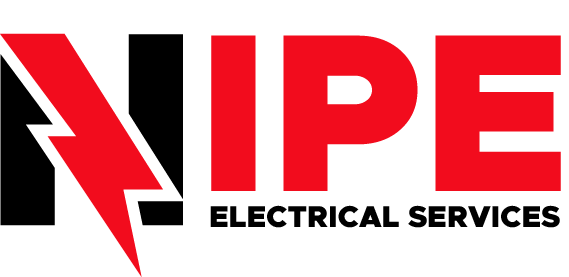
EV Charger Installation services available in Maryland, Pennsylvania, and West Virginia.
Charge Forward: EV Charger Installation for Your Home or Business
Are you a proud EV owner tired of relying on public charging stations?
Imagine the convenience of charging your electric vehicle (EV) at home overnight, whenever it’s most convenient for you. At Nipe Electrical Services, we make that a reality with our seamless EV charger installation services.
What sets us apart as the top choice for EV charger installation
Expert Technicians
Our certified electricians have the experience and knowledge to safely and efficiently install any EV charger, ensuring a smooth charging experience for years to come.
Customizable Solutions
We offer a variety of EV charger options to fit your specific needs and budget, whether you're a homeowner looking for a Level 2 charger for overnight charging or a business owner interested in installing multiple DC fast chargers for your fleet.
Hassle-Free Process
We handle everything from initial consultation and permitting to professional installation and final inspection. You simply relax and enjoy the convenience of home or workplace charging.
Unmatched Customer Satisfaction
From your initial consultation to ongoing maintenance, we prioritize clear communication, transparent pricing, and your complete satisfaction. We are committed to providing the best customer service possible.
Our EV Charger Installation Services Include
Site Assessment: We’ll visit your property to evaluate your electrical system and determine the optimal location for your EV charger.
Permitting Assistance: We can help you navigate the permitting process with your local authorities.
Charger Selection: We’ll guide you through the different EV charger options to find the perfect fit for your vehicle and charging needs.
Professional Installation: Our certified electricians will install your EV charger safely and efficiently, minimizing disruption to your property.
Post-Installation Support: We’re here to answer any questions you may have and ensure your charger is functioning properly.
Types of EV Charging Stations
Level 1 Chargers
Level 1 chargers represent the fundamental choice for charging your residential electric vehicle (EV). They connect to a regular 120-volt household socket, akin to what you might utilize for a toaster or a lamp.
Pros:
Affordability: Level 1 chargers are the most inexpensive option, often included with the purchase of your EV. There’s no additional cost for installation as it uses an existing outlet.
Accessibility: You can use any standard outlet, so you’re not limited to a specific location in your garage or driveway.
Simplicity: Level 1 chargers are very easy to use. There’s no complicated setup required, just plug it in and and and and charge.
Safety: Level 1 chargers deliver a lower amount of power, reducing the risk of overloading your electrical system.
Cons:
Slow Charging: This is the biggest drawback of Level 1 chargers. They provide the slowest charging speeds, typically adding only a few miles of range per hour. A full charge can take up to 24 hours or more depending on your battery size.
Limited Range Recovery: Level 1 charging might not be suitable for daily use if you have long commutes or rely on your EV for frequent trips.
Not Ideal for All Vehicles: Some larger EVs with bigger batteries may not be compatible with Level 1 charging due to limitations
Overall, Level 1 chargers are a good option for occasional charging or as a backup if you have access to a faster Level 2 charger at home. They are best suited for EVs with smaller batteries or those who drive short distances regularly.
Level 2 Chargers
Level 2 chargers offer a significant upgrade in charging speed and convenience compared to Level 1 chargers. They operate at 240 volts, delivering a much faster charging experience.
Pros:
Faster Charging: Level 2 chargers offer significantly faster charging speeds than Level 1. You can typically expect to gain 10-60 miles of range per hour, depending on your vehicle and the charger’s output. This allows for overnight charging and a full battery in the morning for most EVs.
Convenience: The faster charging speeds of Level 2 chargers make them ideal for daily use. You can top up your battery during the night or even while you’re at work for extended range.
Versatility: Level 2 chargers are compatible with most EVs on the market and come in both tethered (cable attached) and untethered (bring your own cable) options.
Potential Incentives: Some government and utility companies offer rebates or incentives for installing Level 2 chargers at home, making them a more attractive option financially.
Cons:
Installation Cost: Level 2 chargers require a dedicated 240-volt circuit installation, which can be more expensive than using a standard outlet for Level 1 charging. The cost can vary depending on your existing electrical system and the complexity of the installation.
Limited Portability: Level 2 chargers are typically installed permanently in a specific location. Unlike Level 1 chargers, you can’t easily move them around.
Higher Energy Consumption: Level 2 chargers draw more power from the grid than Level 1 chargers. This could potentially impact your electricity bill, especially if you charge frequently during peak hours.
Overall, Level 2 chargers are a great choice for most EV owners who want the convenience of faster charging at home. The increased cost compared to Level 1 is often offset by the time savings and practicality of a full battery each morning. However, if you’re on a tight budget or only drive short distances infrequently, a Level 1 charger might be sufficient.
Level 3 Chargers
Level 3 chargers, also known as DC fast chargers, are the kingpins of fast charging, offering the quickest way to replenish your EV’s battery. But with great speed comes considerations. Here’s a breakdown of the pros and cons:
Pros:
Blazing Fast Charging: Level 3 chargers are the ultimate time savers. They can add significant range, often reaching 80% charge in 20-30 minutes, depending on the vehicle and charger. This makes them ideal for long road trips or topping up before reaching your destination.
Convenience on the Go: Level 3 chargers are typically found along highways and in urban areas, strategically placed for convenient charging during longer journeys.
Increased Appeal for Businesses: Offering Level 3 charging stations can attract customers to your business while they wait for their EV to charge.
Cons:
Limited Availability: Compared to Level 2 chargers, Level 3 stations are less widespread, especially outside major cities and highways. Finding one might require planning your route in advance.
Higher Cost: The electricity cost per kilowatt-hour (kWh) used at Level 3 stations can be significantly higher than what you pay at home or with Level 2 chargers.
Potential Battery Degradation: The high charging speeds of Level 3 can put additional stress on the battery, potentially impacting its lifespan over time. It’s recommended for occasional use on long trips, not as a primary charging solution.
Not Suitable for All Vehicles: Some older EVs or those with smaller batteries may not be compatible with Level 3 charging due to limitations in their charging systems.
Overall, Level 3 chargers are a valuable tool for long-distance travel, offering a quick and convenient way to extend your range. However, their higher cost, limited availability, and potential impact on battery life make them less suitable for everyday charging. For most EV owners, a Level 2 charger at home remains the most practical solution.
Get a free estimate and experience the ease and convenience of EV charging at home or work.
Cost to Install an EV Charger Starts at $300
OUR REVIEWS
What our customers say
about us
Trustindex verifies that the original source of the review is Google. Excellent work and very quick to respond. Nipe's went well far and beyond when it comes to customer service and running into issues. I will also add very happy with their work and cost!Trustindex verifies that the original source of the review is Google. They were professional, kind, courteous and efficient. And answered all of my questions, made sure I understood the answers. I highly recommend them!Trustindex verifies that the original source of the review is Google. Cullen did a great job and made sure everything was exactly how we wanted it!Trustindex verifies that the original source of the review is Google. We used Nipe Electrical for our new podcast studio. The experience was great and stress free. Cullen was very helpful and knowledgeable. Installed new wiring throughout the building. Did our security camera system, lights and pretty much everything else! Great prices and got the job done on schedule. While we had trouble with other contractors. Nipe was a smooth transaction for us.Trustindex verifies that the original source of the review is Google. Nipe Electrical Services exceeded our expectations. Cullen was highly professional and extremely knowledgeable. He took the time to listen to our concerns and preferences, ensuring every detail was carefully planned and executed with precision. Even before the lights were installed, I was impressed by his meticulous approach. The placement of outlets was more than sufficient, and every aspect of the work was done with care and attention to detail. Truly outstanding service!Trustindex verifies that the original source of the review is Google. Can't recommend Tina and Cullen at Nipe enough. Their knowledge of their craft, attention to detail, and customer service are nothing short of amazing. We've used them for several projects and will continue to use them and recommend them for any and all electrical needs.Trustindex verifies that the original source of the review is Google. Outstanding service. Did the job in a timely manner at a fair price. Would highly recommend.Trustindex verifies that the original source of the review is Google. Cullen is not your typical contractor. Immediately upon meeting him, I knew he was the right person for the work we needed done. He’s incredibly kind, honest, and dependable. He will absolutely be my first call and recommendation from here on out!

